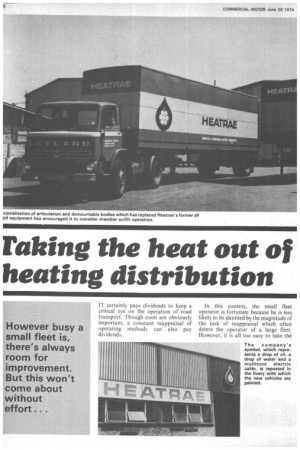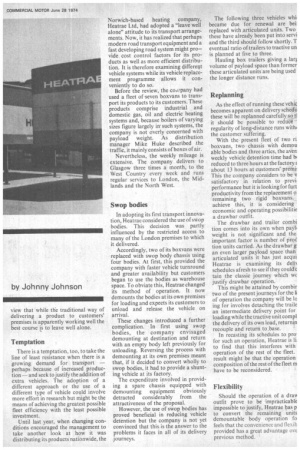Taking the heat out of beating distribution
Page 48

Page 49

If you've noticed an error in this article please click here to report it so we can fix it.
IT certainly pays dividends to keep a critical eye on the operation of road transport. Though costs are obviously important, a constant reappraisal of operating methods can also pay dividends In this context, the small fleet operator is fortunate because he is less likely to be daunted by the magnitude of the task of reappraisal which often deters the operator of a large fleet. However, it is all too easy to take the view that while the traditional way of delivering a product to customers' premises is apparently working well the best course is to leave well alone.
Temptation
There is a temptation, too, to take the line of least resistance when there is a growing demand for transport — perhaps because of increased production — and seek to justify the addition of extra vehicles. The adoption of a different approach or the use of a different type of vehicle could involve more effort in research but might be the means of achieving the greatest possible fleet efficiency with the least possible investment.
Until last year, when changing conditions encouraged the management to take another look at how it was distributing its products nationwide, the Norwich-based heating company, Heatrae Ltd, had adopted a "leave well alone" attitude to its transport arrangements. Now, it has realized that perhaps modern road transport equipment and a fast developing road system might pro-vide. cost control factors for its products as well as more efficient distribution. It is therefore examining different vehicle systems while its vehicle replacement programme allows it conveniently to do so. Before the review, the coinpany had used a fleet of•seven boxvans to transport its products to its customers. These products comprise industrial and domestic gas, oil and electric heating systems and, because boilers of varying sizes figure largely in such systems, the company is not overly concerned with payload weight. As distribution manager Mike Huke described the traffic, it mainly consists of boxes of air.
Nevertheless, the weekly mileage is extensive. The company delivers to Glasgow three times a month, to the West Country every week and runs regular services to London, the Midlands and the North West.
Swop bodies
In adopting its first transpoi t innovation, Heatrae considered the use of swop bodies. This decision was partly influenced by the restricted access to many of the London premises to which it delivered.
Accordingly, two of its boxvans were replaced with swop body chassis using four bodies. At first, this provided the company with faster vehicle turnround and greater availability but customers began to use the bodies as warehouse space. To obviate this, Heatrae changed its method of operation. It now demounts the bodies at its own premises for loading and expects its customers to unload and release the vehicle on arrival.
These changes introduced a further complication. In first using swop bodies, the company envisaged demounting at destination and return with an empty body left previously for unloading. Reversing the process with demounting at its own premises meant that, if it decided to convert wholly to swop bodies, it had to provide a shunting vehicle at its factory.
The expenditure involved in providing a spare chassis equipped with demounting equipment obviously detracted considerably from the attractiveness of the proposal.
However, the use of swop bodies has proved beneficial in reducing vehicle detention but the company is not yet convinced that this is the answer to the problems it faces in all of its delivery journeys. The following three vehicles whit became due for renewal are beii replaced with ,articulated units. Two these have already been put into servi and the third should follow shortly. T eventual ratio of trailers to tractive un is planned at five to three.
Hauling box trailers giving a lark volume of payload space than former these articulated units are being used the longer distance runs.
Replanning
As the effect of running these vehic becomes apparent on delivery schedu these will be replanned carefully sot] it should be possible to reduce • regularity of long-distance runs with the customer suffering.
With the present fleet of two ri boxvans, two chassis with demou able bodies and three artics, the aven weekly vehicle detention time had 1)1 reduced to three hours at the factory E about 13 hours at customers' pretni! This the company considers to be v satisfactory in relation to previ, performance but it is looking for furt productivity from the replacement o remaining two rigid boxvans. achieve this, it is considering economic and operating possibilitie a drawbar outfit.
The drawbar and trailer combi tion comes into its own when payll weight is not significant and the important factor is number of prod tion units carried. As the drawbar g. an even larger payload space than articulated units It has just acqui Heatrae is examining its deliA schedules afresh to see if they could c tam n the classic journey which wc justify drawbar operation.
This might be attained by combir two of the present journeys for the k of operation the company will be lc ing for involves detaching the traile an intermediate delivery point for loading while the tractive unit compl the delivery of its own load, returnin recouple and return to .base.
In recasting its schedules to pro. for such an operation, Heatrae is Ii; to find that this interferes with operation of the rest of the fleet. result might be that the operation composition of the rest of the fleet m have to be reconsidered.
Flexibility
Should the operation of a dray outfit prove to be impracticable impossible to justify, Heatrae has p to convert the remaining units demountable body operation fo feels that the convenience and flexib provided has a great advantage ove previous method. '












































































































